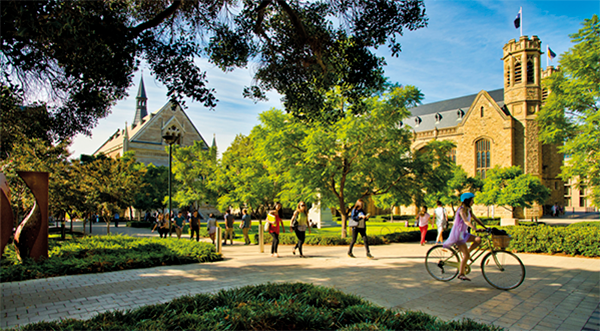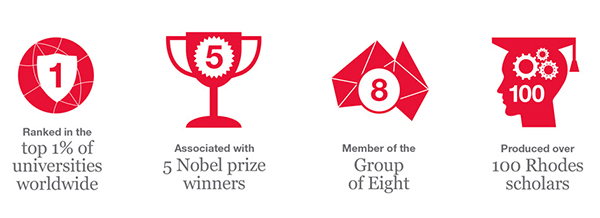|
|
|
|
|
Parent newsletter - may 2020 |
|
|
|
Welcome to our first Parent Newsletter of 2020!
The aim of this newsletter is to update parents and guardians of senior high school students with important information at regular intervals throughout the year.
We will provide some basic advice for those who are new to the process, let you know of any opportunities to visit the campus or engage with our online activities, and keep you up-to-date with everything you need to know to help your child achieve their dream of university education.
This month we will be kicking off the first in a series of regular parent information sessions. Please register your attendance for the first session on 27th May at 6pm.
Due to the current COVID-19 conditions we will be starting our 2020 sessions with some online offerings and will then review the situation as the year progresses.
You may also have heard about our new alternative pathway based on Year 11 results. For more information about this new pathway, take a look at our dedicated web page.
We hope you find the information below helpful.
Kind regards,
The Future Student team |
|
|
|
| Update Your Details |
If your contact details have changed, please let us know and we can ensure that you receive the right information. You can also unsubscribe below, if you no longer require these updates.
|
|
|
|
|
|
| University Entrance - The Basics | IMPORTANT NOTE: The following information is provided within the very fluid COVID-19 situation. There could be significant changes or additional entry pathways coming up over the next few months. These could be at a state or federal level, or they could be applicable only to individual institutions. We will update you as soon as we know.
1. Look at possible study areas
The first thing to do at the beginning of Year 12 (or during Year 11) is to have a discussion with your child about their areas of interest. At this early stage of the year, they do not need to reach a firm decision. However, it is good to start narrowing down some ideas and there are some great resources out there to help you, such as the government’s Job Outlook, or our own Degree Finder.
2. Meet the basic entry criteria
At the same time as exploring all of their ideas, they will have to work on finishing their high school studies. In order to get accepted into a South Australian university, they will need to do one of the following:
Complete the South Australian Certificate of Education (or one of its interstate equivalents) or complete the International Baccalaureate (IB) and receive an Australian Tertiary Admission Rank (ATAR)
In simple terms, their SACE high school result turns into a ‘university aggregate’, which then becomes an ATAR (or an 'ATAR equivalent' if they do the IB) Their ATAR is a ranking between 0.00 to 99.95, and the position within this range will determine which degree they are likely to be accepted into. This is because entrance is on a merit basis and some degrees are more popular than others. Universities usually publish past ATARs to give you an idea of what the standards might be in the forthcoming year.
Complete any prerequisite subjects
For some degrees, applicants will need to have completed certain Stage 2 SACE subjects (or IB equivalents) in advance. These 'prereqs' are vital because they form the basis of the knowledge that we will build on at tertiary level. If your child has the required ATAR for entry but is missing the correct prerequisites, then we can suggest an alternative pathway. For example, this may consist of applying for a related degree that does not have prerequisites and then doing an internal transfer at a later stage.
(Please also note that if 'assumed knowledge' subjects are listed by the universities, these are useful but not essential to an application)
IMPORTANT: If your child is currently in Year 12 and is not studying the correct prereqs, speak to us as soon as you can for advice. Also, if your child is in Year 11, do some planning with the school counsellor to make sure that the correct Stage 2 subjects will be possible.
Satisfy any additional entry requirements
Some degree areas (such as music, drama, or visual arts) may require an audition or a portfolio. Also, some other areas (such as Medicine or Dental Surgery) require not only a completed independent examination such as the University Clinical Aptitude Test (UCAT) but also a structured oral assessment interview. International students will also have extra entrance criteria to be aware of. Please contact us for advice on this.
3. Apply through SATAC
All applicants apply online through the South Australian Tertiary Admissions Centre (SATAC). SATAC handle the applications for all SA universities. Within the one application, your child will apply for 6 choices (these are called ‘preferences’) across all the SA universities. Applications open in August 2020, although the offer rounds do not begin until December 2020 and continue into January and February 2021. All SA high school Year 12s will receive a free SATAC Guide through their school and the universities will hold public Open Days
in August to help you with your decision making.
4. And that’s it!
Later in the year we will outline the detailed timelines for 2020 applications, offers, and enrolment. But at this stage just make sure that study areas and prerequisites have been researched and that an entry plan (and a plan B!) are being discussed within your family.
|
|
|
|
|
|
|
|
|
Don't need help |
| If your child has started university and you no longer require updates, you can let us know by unsubscribing. |
|
|
|

|
| Spread the word | | If you know of someone who would also like to receive updates from us, simply forward this email so they can subscribe for updates too. |
|
|
|
|
|
|
| Fees and Other Costs | We understand that investing in quality education can come at a significant cost. But the good news is that the federal government supports all Australian citizens through the Higher Education Contribution Scheme (HECS).
Alternatively,
if your child is an Australian permanent resident (or is still of international student status) then please contacts us or see our Student Finance page for further details regarding fees and costs.
It is also crucial to remember that the University offers scholarships to a number of undergraduate students. These scholarships, as well as many others funded by industry and non-profit organisations, are available to both potential and currently enrolled students.
|
|
|
|
| Adjustment Factors (Previously Bonus Points) | If a high school student has studied particular subjects in Year 12, or sits in an equity category (determined by the school they attend, or if they are eligible for Government assistance) adjustments can be applied to their university aggregate, to calculate an overall selection rank.
Adjustment factors are applied automatically by SATAC within an application once a student's ATAR is available. Read more about how adjustments are made on the SATAC website. If you'd like to clarify your child's adjustment factors, please contact us or their school career counsellor.
|
|
|
|
|
|
|
Other Entry Pathways |
If your child’s ATAR or IB result is not high enough for entry into the degree of their choice, do not panic! This is a common situation and we have other solutions in place.
The Special Tertiary Admissions Test (STAT) is one option and success in this one-off exam can lead to university entrance. The other main entry point is through completion of a wide range of training and VET courses at providers such as TAFE SA.
We also have a brand new subject based admissions program which can allow high school students to enter the University of Adelaide via achieving success in certain SACE subjects, rather than through an ATAR-only route.
More details about all of these routes can be found on our pathways website.
|
|
|
|
| We're Here to Help | Everyone in our team genuinely believes that university is one of the most useful, rewarding, and fun experiences that a person could ever undertake. We are here to help you and your child get involved with the rich opportunities that we have to offer.
In the next newsletter, we will look at the next important steps, including a detailed look at choosing the best university accommodation if that is relevant to your situation.
If you would like to get in touch with us in the meantime, we are available on the following channels:
|
|
|
|

|
The University of Adelaide
Adelaide, South Australia
5005 Australia
Phone: +61 8 8313 7335
|
Copyright © 2020 The University of Adelaide.
CRICOS Provider Number 00123M
|
|
|
|
For the purpose of the SPAM Act 2003, this email is authorised by the University of Adelaide.
You have received this email as you are subscribed to receive future student communications from the University of Adelaide. If you no longer wish to be contacted you can update your preferences or unsubscribe.
|
|






